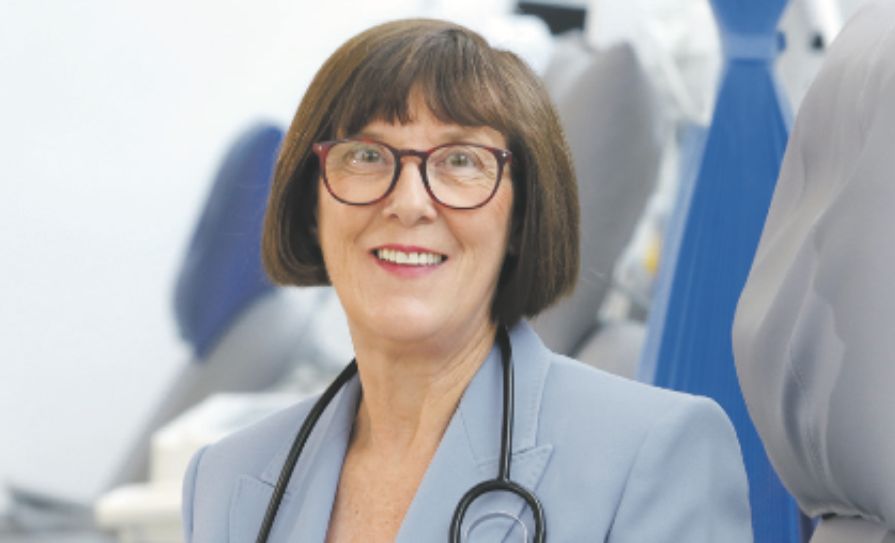
The Hadden Lecture was among the highlights of the Joint Irish-UK Endocrine Meeting. President of the Irish Endocrine Society (IES), Prof Fidelma Dunne, Professor in Medicine at the University of Galway, said that delivering the Hadden Lecture is the “highest honour” the Society can bestow on a colleague. The lecture is given in memory of Prof David Hadden, who was a Consultant Physician at the Royal Victoria Hospital and Honorary Professor of Endocrinology at Queen’s University, Belfast. Prof Hadden was instrumental in uncovering the role of diet in type 2 diabetes, among many other contributions to his field, before his death is 2014. He was a founding member of the IES.
The 2024 Hadden Lecture was delivered by Prof Maralyn Druce, Consultant Endocrinologist, Barts Health NHS Trust, UK, Professor of Endocrine Medicine, Barts and the London School of Medicine and Dentistry, and Senior Editor of Clinical Endocrinology. Her presentation was titled: ‘The endocrinologist’s role along the patient cancer journey – from pre-diagnosis to survival and vitality and beyond’. She began with a personal and professional tribute to Prof Hadden, adding that he “inadvertently got me started on my journey as an endocrinologist”, when he co-edited a book for which Prof Druce had written a chapter on diabetes in her early career. Quoting from his obituary in The Lancet, she said Prof Hadden “was always a gentleman, very open to talk to, and a pleasure to work with”.
Moving on to her presentation, Prof Druce examined the complexity of the endocrinologist’s role throughout the cancer trajectory. She said that listening to patients, considering options, discussing these with patients, and linking with members of the multidisciplinary team, are perhaps “the greatest contribution we can make”. She discussed the ways in which endocrinologists might interface with a cancer journey, such as managing patients with an increased risk of cancer in endocrine organs, patients with cancer in endocrine organs, and patients at risk of endocrine injury because of either cancer or cancer treatment.
Prof Druce shared direct quotes from patients which described their lived experiences, before she discussed the limitations of existing guidelines and the “explosion of data” in the literature. “It’s not always the cancer itself that impacts life,” she emphasised, adding that many cancer therapies result in “direct and intended acute toxicities to the endocrine system”, as well as long-term effects. “We need to be literate, not just in the management of long-term sequalae such as bone health, but also increasingly in the management of symptoms associated with them,” she said.
Prof Druce then presented data on persistent and later toxicities arising from treatment of childhood cancer, highlighting the substantial increases in survivorship, and of “patients living beyond cancer”. She noted that mortality was not the “only issue” and described a range of morbidities that can accumulate over time.
The conference heard that survivors of childhood cancers have significantly higher risks of developing morbidities when compared to their siblings and that notably high rates of late endocrine effects exist among this population. “There’s a high prevalence of endocrinopathy, but not necessarily high mortality, from late endocrine effects in general,” according to Prof Druce. She discussed the post-cancer pathologies that can affect the thyroid, the hypo-pituitary-axis, bone health, obesity, metabolism, and other endocrine processes, and what this means for endocrinologists
“What is clear from some of these long-term cohort studies is that the impact of endocrine late effects is not just on the endocrine system…. We might think that if we replace the hormones everything will be fine. In fact, endocrine late effects, excluding weight-based effects, track with life morbidity such as depression, PTSS [post-traumatic stress syndrome], emotional regulation, and social function; even when well-managed.”
Concluding, Prof Druce said that “we don’t yet have the data on late effects” and she acknowledged the existence of many clinical, economic, and practical “unanswered questions”. Regarding the role of the endocrinologist, she said “we are there to guide our patients [through] the roadblocks with the information and knowledge that we have”. She advocated supporting the patient “through their chronic ill-health, keeping them optimal both in terms of their psychological [wellbeing] and quality-of-life, and also in terms of their endocrine health”.





Leave a Reply
You must be logged in to post a comment.